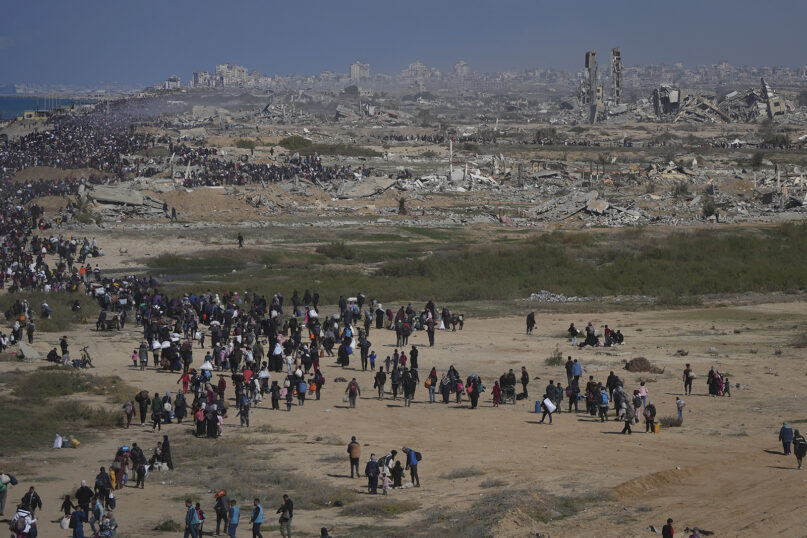
JERUSALEM (RNS) — Israelis and Palestinians were caught completely off guard by President Donald Trump’s proposal for the United States to “take over” Gaza and permanently relocate the entire Palestinian population to another country.
Trump dropped his bombshell during a White House news briefing Tuesday (Feb. 4) alongside visiting Israeli Prime Minister Benjamin Netanyahu. It was already midnight in Israel, so most locals learned on the morning news of the president’s proposal to rebuild the Gaza Strip — an arid strip of land with a beautiful Mediterranean coastline — into a “Riviera of the Middle East.”
“I do see a long-term ownership position, and I see it bringing great stability to that part of the Middle East,” Trump said.
Within hours, Palestinian leadership, as well as the leaders of several Arab nations — including Saudi Arabia, United Arab Emirates, Egypt and Jordan — had rejected the idea. Officials from the U.N. condemned the proposal, saying forcible removal of Gazans would be “strictly prohibited” and cautioning against “any form of ethnic cleansing.” The governments of Spain, France, Russia, China and others also issued statements decrying Trump’s suggestion.
Last month, Trump called Gaza “a demolition site” that needed to be “cleaned out” after the 15-month-long Israel-Hamas war and the current fragile ceasefire. He also called on Jordan and Egypt to accept as many as 2 million Palestinians.
But those comments, made seemingly off-the-cuff to reporters on Air Force One, did not explicitly call for the permanent removal of Gaza’s population or a long-term U.S. takeover.

Israeli Prime Minister Benjamin Netanyahu, left, and U.S. President Donald Trump speak during a news conference in the East Room of the White House, Feb. 4, 2025, in Washington. (AP Photo/Alex Brandon)
In Israel, reaction to the “Trump plan” was met with stunned disbelief across the political spectrum — even as acceptance or rejection of it fell somewhat predictably along ideological lines.
The left-wing nongovernmental organization B’Tselem — The Israeli Information Center for Human Rights in the Occupied Territories — called the plan “deranged and reprehensible.” Regardless of its feasibility, “the very fact of its announcement is an indelible moral stain on all involved,” the NGO said. Implementing such a plan constitutes “ethnic cleansing” and “a grave violation of international law,” it said in a statement.
The plan appealed to some far-right religious Israelis, who have long dreamed of a return to Gaza. In 2005, Jewish settlers and troops were ordered to evacuate Gaza and parts of the West Bank by Prime Minister Ariel Sharon, in hopes that the retreat, besides reducing tensions, would improve Israel’s standing with Western nations. Some Jews, who count Gaza as part of their biblical inheritance, saw the abandonment of the strip as its own act of ethnic cleansing. Strategically, the pullback failed as well, as two years later, Hamas violently overturned the more moderate Fatah party’s victory at the polls and took control of the strip.
Malkah Fleisher, who lives in a settlement in the West Bank — what she calls “Judea,” the biblical term — praised Trump’s plan in a tweet.
“Gaza is the Land of Israel, and the Land of Israel is sacred to the Jewish people,” Fleisher tweeted. “That being said, I think we are also watching a miracle unfold. For generations, we have wondered how issues of demographics would work out here — and the answers seem to be coming as if out of a dream that we could never have envisioned,” Fleisher said.
“We should be thanking God for the incredible gift we are being given — and frankly, the Gazans should be thanking Him, too, because this solution is nothing short of a salvation for them. I don’t know if casinos will be a draw on the shores of Gaza, but a Costco, Walmart, and Target sure will,” Fleisher continued.
Trump supporters, including some in Israel, have shared memes depicting Gaza as the “MAGA Strip,” Trump as Moses leading Palestinian children out of Gaza, and Trump Towers overlooking the Gaza beach.
Both Israelis and Palestinians are wondering how seriously to take Trump’s extreme pronouncements. The newly inaugurated president, less than a month into his second term, has already suggested the U.S. take over the Panama Canal, Greenland and Canada. Some have suggested his proposal was a tactic to shock all parties into working toward a more moderate but still out-of-the box solution to the century-old conflict.
Sara K. Eisen, an American Israeli who calls herself a “Trump agnostic,” thinks Trump’s statements are “strategically calculated” and aimed at Palestinians in Gaza who claim both Gaza and Israel as their homeland and want to return to it.
“If you are refugees, relocating to a better place is a great deal. If Gaza is your home and you can’t leave it, then build it and stop insisting on the Right of Return and the destruction of Israel. Because the days of having it both ways are over,” Eisen said.
Riyad Mansour, Palestinian envoy to the United Nations, insists that Gaza and what is today the state of Israel are both the “ancestral homeland” of Palestinians.

Palestinians return to northern Gaza, amid destroyed buildings, after Israel’s decision to allow thousands of them to return for the first time since the early weeks of the 15-month war with Hamas, Jan. 27, 2025. (AP Photo/Abdel Kareem Hana)
“This is our answer for those who want to kick us out of the Gaza Strip: There is no power on earth that can remove the Palestinian people from our ancestral homeland, including Gaza,” Mansour told the U.N. General Assembly.
“For those who want us to have a happy place and safe place, we will be delighted to return to our homes inside the state of Israel. This is where we originally were kicked (out) from. If they want to do that for us, we will welcome it, but short of that, Gaza is part of the state of Palestine.”
Ahmed Fouad Alkhatib, a Gaza-born resident senior fellow at the Atlantic Council, said the Palestinian people “see themselves as pawns,” not only in the hands of Hamas and the international community, but in Trump’s plans as well.
While many Palestinians consider Trump’s words “empty threats” and refuse to believe the U.S. will send troops to the Gaza Strip, the fact that Trump has doubled down on his intentions to evict Palestinians is deeply worrying, Alkhatib told i24News.
Though Alkhatib is completely opposed to the forced emigration of Palestinians, “I believe strongly that those who want the option to leave should have that at their disposal. Who am I or any of us in the safety of our homes to impose on Palestinians what they should do against their will?” he said.
From his daily conversations with Gaza-based friends, family and colleagues, he estimates that two-thirds of Gazans would not leave if given the chance, even temporarily.
Alkhatib said Trump’s framing of how the U.S. can help Gaza remove tons of rubble and exploded munitions as a benevolent act is a “bizarre twist,” given that under his relocation plan, Palestinians would not be there to benefit.
“Gazans would love this to be Gaza’s final war and want to be there when the place is transformed,” he said.
